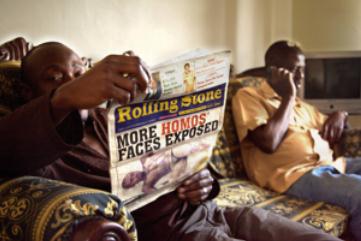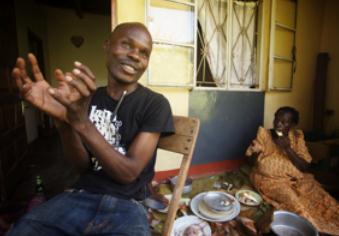
The Call Me Kuchu Hot Docs screening is its North American premiere. It won the Teddy Award for Best Documentary and the Cinema Fairbindet Prize at the Berlin Film Festival.
Uganda’s anti-homosexuality bill – what a Toronto lawyer calls “the full homophobia buffet” – is quietly making its way back through the system after being dismissed by the Ugandan parliament last year.
“A lot of people thought we solved that problem, we killed that bill,” says Doug Elliott, past president of the International Lesbian and Gay Law Association. “Previously people were horrified. They thought this bill was savage, inhumane . . . And now it’s back.”
When the bill was introduced in the Ugandan parliament in late 2009, it garnered worldwide attention and condemnation. Lawrence Cannon, then Canada’s minister of foreign affairs, said it was “deplorable and disregards basic human rights.” Stephen Harper raised concern over the bill with Uganda’s long-time president Yoweri Museveni. Many governments, including those of the United States and France, spoke out. Many public protests were held.
Last spring, the Ugandan parliament closed before the bill was passed, effectively ending the discussion for the year.
But it is back, essentially unchanged, after being reintroduced into parliament in February. A committee report is due any day, and if it passes through a third reading and goes to Museveni for approval, it could become law by June.
“They have introduced every dream provision that they can think of to attack our community, such as the requirement that people turn in their [gay] family members, friends or customers or they can face imprisonment themselves. That is unheard of anywhere in the world,” Elliott says. “It would make Uganda the worst country in the world, in terms of the legal regime, for the gay community.”
The bill proposes the death penalty for “aggravated” homosexual acts (defined as when one partner has HIV) and also bans the promotion of homosexuality, a provision the gay community fears will immediately shut down any gay-friendly organization or group.
While the bill is debated once again, a documentary following its creation, and those who are courageously fighting against it, will screen in Toronto in May as part of Hot Docs, the Canadian International Documentary Film Festival, and the Inside Out LGBT Film Festival.
Call Me Kuchu tells the story of several passionate gay rights advocates, including David Kato, once a school teacher and considered to be Uganda’s first openly gay man. A year into filming, in January 2011, Kato was murdered at his home, a heartbreaking turn of events for those who knew him and for the gay struggle at large.
“Since his murder, David has been mythologized as a courageous and passionate human rights activist — which is exactly what he was,” says Malika Zouhali-Worrall, one of the film’s two directors.
“However, over the time that we spent filming with him, we also got to know a man who was charismatic and sharp-witted, yet vulnerable and often afraid to sleep alone.”
The film also introduces David’s friends and fellow activists, such as Stosh, a transgender man who endured a “corrective” rape at a young age that left him HIV-positive; and Bishop Senyonjo, who has been thrown out of the Anglican Church of Uganda for defending Uganda’s “kuchus.”
“There is a reason why people around the world are talking about this issue, and it’s because the kuchus have worked relentlessly to push their movement forward,” says co-filmmaker Katherine Fairfax Wright. “We hope [the film] will provide audiences with a new understanding of Kampala’s kuchus, as a community that has achieved a significant amount in the past 18 months.”
Indeed, despite the bill’s reintroduction, gay rights are far from being a lost cause in Uganda. Some organizations within Ugandan civil society have condemned the bill, and there was quiet lobbying against it from international parliamentarians, including those from Canada, during a recent meeting in Kampala.
Also, in the past year, several gay rights advocates have won international human rights awards, bringing their plight to a larger audience, and just last month, one of the prominent gay rights groups there, Sexual Minorities Uganda, or SMUG, filed a lawsuit against US evangelical minister Scott Lively for his involvement in inciting anti-gay sentiments in the country, which led to violence against gays like Kato.
The successes, and challenges, in Uganda aren’t in isolation, Elliot says.
“There’s a lot at stake. It’s not about some crackpots in some other country. This is a threat to our movement everywhere in the world.”
The Deets:
Call Me Kuchu
Hot Docs
Wed, May 2 at 9:45pm and Sat, May 5 at 9pm
Isabel Bader Theatre
93 Charles St W
Thurs, May 3 at 7pm
TIFF Bell Lightbox
350 King St W
Inside Out LGBT Film Festival
Sat, May 19 at 4:45pm
TIFF Bell Lightbox
350 King St W
For a full list of Hot Docs’ gay highlights, click here.

 Why you can trust Xtra
Why you can trust Xtra


